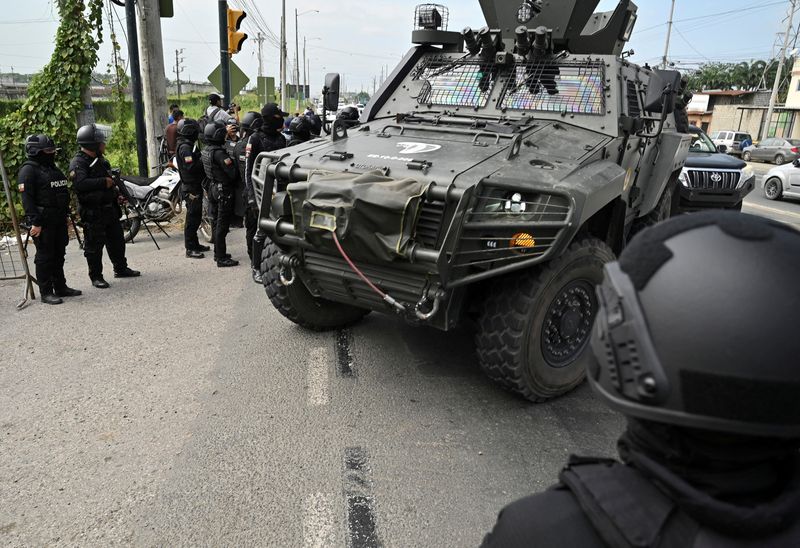Written by Alexandra Valencia
QUITO (Reuters) – Latin American governments, including regional power Brazil, said on Saturday that they would not be able to move around Mexico after their embassy in Ecuador was raided to arrest a controversial politician who had been granted asylum by Mexican authorities. rallied together.
The arrest late Friday night of former Ecuadorian vice president Jorge Glas, who was detained on corruption charges, triggered Mexico City to suspend ties with Quito, an unprecedented move by the government of Mexican President Andrés Manuel López Obrador. denounced diplomatic violations and arrests. It is an “authoritarian” act and a violation of international law and Mexico's sovereignty.
The government of Ecuadorian President Daniel Novoa had argued that Mr. Glass' asylum protection was illegal because of the corruption charges he faces.
Still, under international law, embassies are considered sovereign territory of the countries they represent.
On Saturday, governments across the political spectrum in Latin America, including left-wing Brazil and Colombia and right-wing Argentina and Uruguay, harshly criticized the arrest of Mr. Gras, who had been seeking asylum at the embassy since December.
A video circulating on social media shows him being led in a police convoy to the airport in the capital Quito, flanked by heavily armed soldiers. He then boarded a plane en route to a prison in Guayaquil, the largest city in the Andes.
Photos on social media, including one posted by Cuba's foreign minister, showed armed police and soldiers scaling what appeared to be a wall at the embassy. Reuters could not immediately confirm the authenticity of the photo.
Brazil's government condemned Ecuador's move as a “clear violation” of international norms prohibiting such attacks on foreign embassies.
Ecuador's move against the embassy “must be subject to strong repudiation, whatever the justification for its execution,” a statement from Brazil's Ministry of Foreign Affairs said, underscoring the solidarity between Brasilia and Mexico.
“Major violation”
In an interview with local broadcaster Milenio on Saturday morning, Mexico's top diplomat Alicia Bárcena expressed shock at Ecuador's incursion into the country's embassy in Quito's financial district, saying that some embassy staff were killed in the attack. He added that he was injured. She added that her asylum was granted after a thorough analysis of the circumstances surrounding the charges Glass faces.
Mexico's Ministry of Foreign Affairs announced that it would file a lawsuit with the United Nations' International Court of Justice for “serious violations of international law.”
Also on Saturday, the Washington-based Organization of American States called for dialogue to resolve the escalating conflict between Ecuador and Mexico, calling for the organization's Permanent Council to discuss the need for “strict compliance.” It added a statement that it would be convened. Including international treaties guaranteeing the right to asylum. ”
Meanwhile, Colombian President Gustavo Petro argued in a post on X that Latin America “must continue to uphold the norms of international law in the midst of ongoing barbarism around the world.”
In a separate statement, the Petro government said it would seek human rights and legal protection for Mr. Glass, who is currently in custody.
Glass, twice convicted of corruption, has been holed up in the embassy in Quito since December when he applied for political asylum, which Mexico granted on Friday.
Ecuadorian authorities unsuccessfully asked Mexico for permission to enter the embassy and arrest Glass.
In 2017, Gras, a fellow leftist and former second-in-command to former President Rafael Correa, was sentenced to six years in prison after being found guilty of accepting bribes from Brazilian construction company Odebrecht in exchange for government contracts. was sentenced. .
Mr. Glass faces a new arrest warrant on unrelated corruption charges, which the Ecuadorian government denies, claiming he is the victim of political persecution.
(Reporting by Alexandra Valencia; Writing by David Alire Garcia; Editing by Andrea Ricci and Alistair Bell)


